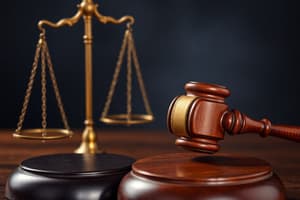Podcast
Questions and Answers
What is the penalty for contraventions?
What is the penalty for contraventions?
- Minor prison sentences
- Mandatory community service
- Fines (correct)
- Imprisonment with hard labor
Which category of crime includes the severest penalties?
Which category of crime includes the severest penalties?
- Contraventions
- Felonies (correct)
- Délits
- Misdemeanors
What distinguishes a felony from a misdemeanor?
What distinguishes a felony from a misdemeanor?
- Felonies are considered less serious than misdemeanors
- Misdemeanors are generally punishable by fines or imprisonment (correct)
- Felonies are always tried in summary court
- Misdemeanors are punishable by more severe penalties
How are felonies categorized in the UK?
How are felonies categorized in the UK?
What are the penalties typically associated with crimes categorized as Délits?
What are the penalties typically associated with crimes categorized as Délits?
In which countries are criminal codes primarily used?
In which countries are criminal codes primarily used?
What distinguishes the role of judges in common law countries from that in civil law countries?
What distinguishes the role of judges in common law countries from that in civil law countries?
Which of the following statements about the United States criminal law system is true?
Which of the following statements about the United States criminal law system is true?
What was the significance of the Criminal Code enacted in Canada in 1892?
What was the significance of the Criminal Code enacted in Canada in 1892?
Which of the following statements is a characteristic of civil law countries?
Which of the following statements is a characteristic of civil law countries?
Flashcards
Civil vs. Common Law Criminal Systems
Civil vs. Common Law Criminal Systems
Civil law systems rely on written codes, while common law systems use statutes and case law.
Role of Judges in Civil Law
Role of Judges in Civil Law
Judges in civil law systems apply the pre-existing law, rather than developing it through precedent.
Role of Judges in Common Law
Role of Judges in Common Law
Judges in common law systems interpret laws and create precedents.
Criminal Codes in Canada
Criminal Codes in Canada
Signup and view all the flashcards
US Criminal Law Origin
US Criminal Law Origin
Signup and view all the flashcards
Crime Categories
Crime Categories
Signup and view all the flashcards
Délit
Délit
Signup and view all the flashcards
Contravention
Contravention
Signup and view all the flashcards
Felony
Felony
Signup and view all the flashcards
Misdemeanor
Misdemeanor
Signup and view all the flashcards
Study Notes
Legal Systems
-
Civil law countries: Most European and Latin American countries, as well as many countries in Africa and Asia, use criminal codes. France uses the "code pénal".
-
Common law countries: English-speaking countries use statutes and case law. England has an uncodified system, meaning English criminal law is a collection of statutes and general principles mainly from court decisions.
Criminal Law in Specific Countries
-
Canada: Has a federal criminal code (1892), "the national code for the whole country". The Criminal Code was made law in 1892 by the Parliament of Canada in accordance with the Constitution Act of 1867, which gives the federal government power to make criminal laws and enforce them in self-governing jurisdictions in the British Empire.
-
Australia: Has a federal code plus state-based codes. The 8 Australian states and territories have powers to enact their own criminal laws. The Commonwealth also has the power to enact laws.
-
US: American criminal law is primarily a matter for the individual states in contrast to Canada. The 50 states have their own criminal codes. There were attempts to make a federal code (the 1962 Model Penal Code), but it was never enacted completely but influenced state codes. Title 18 of the US code deals with federal crime and criminal procedures.
Role of Judges
-
Judges apply the law as it is written (central role of the legislature in developing the legal code).
-
Judicial review: Judges interpret statutes or the constitution deriving from judicial interpretations of legislative statutes or the constitution.
Studying That Suits You
Use AI to generate personalized quizzes and flashcards to suit your learning preferences.




